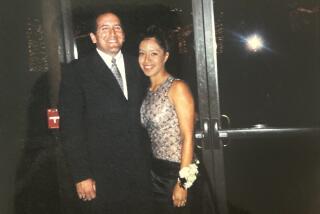‘Gossip Girl’ 2.0 may be ‘woke.’ But its hot-for-teacher subplot could raise eyebrows
- Share via
The following contains spoilers from Episode 4 of “Gossip Girl” on HBO Max.
In HBO Max’s reboot of the popular teen soap “Gossip Girl,” which premiered earlier this month, the kids at the center of the story are fearless — and used to getting what they want.
Why should über-wealthy New York adolescents raised on the internet bother sucking up to teachers to ensure admittance to an Ivy? They’re already famous, whether by social media or birthright, so it’s easier to bully the educators until they break down or get fired. Why should they engage in a Twitter feud or admit they’re wrong online? They can just use their phones to doctor photographic evidence in their favor. Why let romantic desires remain in the realm of fantasy when they can make them a reality? They can sleuth out their lust objects’ favorite haunts and keep showing up until they acquiesce. (And maybe also reciprocate.)
The last of these — all drawn from the four episodes of the series that have aired — is a plotline featuring Max, Thomas Doherty’s slick, sycophantic 17-year-old, who sets his sights on classics teacher Rafa Caparros (Jason Gotay). He finds him at a club, cruises him at a bathhouse and shows up when he’s showering in the school gym locker room. Rafa initially and repeatedly tells his pupil to step back, but soon softens after learning of problems in Max’s home life and noticing that Max’s drug-and-alcohol habit is out of control.
By the end of the fourth episode, a hoary pop culture trope comes to “Gossip Girl” 2.0: Teacher and student appear to consummate their attraction.
The problem with “Gossip Girl,” premiering Thursday on HBO Max, isn’t that it’s “woke.” It’s that it’s lost the original’s sense of humor.
“Within the writers room, we talked a lot about the sort of scandals that happens at these private schools and there are many scandals related to teacher and student relationships or relations,” says Joshua Safran, creator of the new “Gossip Girl” and himself a graduate of the Bronx’s prestigious Horace Mann School, which has had its own reckoning with sexual assault charges and cover-ups.
He says it also worked within the framework of the show: Max, as well as his friends, was raised to feel mature and sophisticated and, therefore, Safran says, “he believes he lives in an older world,” while Rafa, who frequents the same A-list private clubs and attends the same posh events as his students, “believes that he lives in a younger world.”
But, Safran stresses, Rafa’s decision to be intimate with Max “is completely, morally wrong” and that “he would be a villain if he didn’t know that.” Safran adds that “the goal in watching that is that you’re not meant to be celebrating that this is happening.”
The teacher-student trope is a common one in teen dramas, including “Dawson’s Creek,” “Pretty Little Liars” and “Riverdale.” Even the latest season of teen comedy “Never Have I Ever” has what is meant to be a joke about a student who went to the school in the ‘90s and is still legendary for getting one of the teachers pregnant.
In the original “Gossip Girl,” which aired for six seasons on the CW and on which Safran served as a writer and producer, Penn Badgley’s high school student, Dan Humphrey, has a brief affair with teacher Rachel Carr (Laura Breckenridge). When things don’t go well, the audience is meant to pity her as just another victim of Leighton Meester’s queen bee, Blair Waldorf.
Although he says it doesn’t mean it didn’t happen, Safran doesn’t recall any conversations in the original series’ writers room about what that teacher did being “morally wrong.”
But the new iteration of “Gossip Girl” prides itself on being more progressive than the original — many have used the term “woke” —in both the stories it tells and the characters around which it revolves. It has one of the most racially diverse casts in its genre. It features discussions about recognizing one’s generational wealth and privilege — and using it to help others. The scene at the bathhouse ultimately redirects its sexual energies away from the potential teacher-student liaison to another character, Aki (Evan Mock), whose interest in Max spurs him to question his own sexuality: The series is capable of being risqué, even depicting nudity, without depicting a sexually inappropriate encounter.
Until it does.
Thus far, “Gossip Girl” has depicted Max and Rafa stripping off their shirts and passionately kissing — albeit after a whole lot of innuendo. It remains to be seen how the storyline plays out. (“I don’t think you’re supposed to feel badly for Rafa,” Safran says.) But in the context of the series’ politics, and an ongoing discussion about the hazards of depicting such dynamics, the subplot may raise some eyebrows.
While these arcs have traditionally been brief, burned through quickly as the characters move on to the next big thing, recent series like Freeform’s “Cruel Summer” and FX’s more adult-centered limited series “A Teacher” have spent a season’s worth of plot exploring the concept of sexual “grooming” and how a person of authority may use manipulation to earn a victim’s trust before, or as, the abuse begins.
“I think in developing the season, moving forward after the pilot, we did a lot of research and paid a lot of attention to sexual grooming in general,” says “Cruel Summer” showrunner Tia Napolitano. For her story, which is partially about Kate Wallis (Olivia Holt), a popular high schooler in 1990s Texas who was groomed, and then held hostage, by her principal (Blake Lee), Napolitano says “the subtle manipulation was something really important for us to land and show on TV.”
Through the first season, which wrapped earlier this summer, a situation that starts with things that might look like something a kind, if overly concerned, adult might do — like drive Kate home when she’s drunk and crying, a similar turn to what happens on “Gossip Girl” — escalates to where it’s clear Martin has crossed a line. In an episode halfway through the season, Napolitano notes, he begins using “coded language of manipulation,” like telling Kate that he thought she was an adult the first time he saw her.
“We avoided romanticizing” that pairing, she says, adding that “it was very clear that showing two people as meant for each other, despite the age difference, was absolutely not the right thing to do. So we avoided anything that made it look like they were equals or like they were truly in love.”
Heather Drevna, the vice president of communications at anti-sexual assault organization RAINN (Rape, Abuse and Incest National Network), says there’s no data to suggest that the teacher-student storyline in any of its forms has an effect on viewers. Qualitatively, though, she notes that “we’ve seen some positive developments and this narrative changing in a pretty quick time,” despite there being further room for improvement. She also wants to avoid calling the pairings “relationships” because “this is a predatory abuse of power by an adult against a child. And, so, we don’t want to see portrayals that romanticize that in any way.”
She elaborates that, historically, there was more understanding of female victims of these scenarios on TV and points to a 2005 episode of “Veronica Mars” involving Adam Scott’s high school teacher, Chuck Rooks, and a student (played by Christine Lakin, with Meester guest-starring in a pivotal role).
But, Drevna says, “I think, in general, creators don’t seem to know what to do with male victims and female predators… Particularly, that trope of boys being seduced by a teacher: We’ve seen that in the past being portrayed as a teen boy fantasy and making it something almost to be celebrated,” Drevna says. It’s a trope that “A Teacher” thoroughly critiques and that “Gossip Girl” now has to navigate.
‘I like not making it easy,’ says Hannah Fidell, creator of the FX on Hulu series ‘A Teacher.’ ‘I like the idea of having [viewers] be, like: “Ew, why am I feeling this way?”’
“We’re seeing portrayals of that change. We’re seeing a better understanding of male survivorship and what that looks like,” she continues. “[We’re] starting to see that the perpetrator is being called out or punished in some way.” As Safran notes in regards to “Gossip Girl,” “you’ve only seen the first part of it”: “The next episode is where a lot of things happen” because “it was really important [to the writers] for us to talk about it.”
But should the trope be canceled altogether?
Safran says that we can’t ignore that this is “actually a reality in the world” both at high schools and colleges and that “I understand why teen dramas are looking at it.”
“A goal of a good show is that, in whatever world it’s set in, is to look at all of the different areas that it is set in and all the things that have happened in those areas,” he says, adding that “I wanted to look at it not in any way that’s glorifying it and actually show the issues and the emotional ramifications and psychological ramifications.”
‘Gossip Girl’
Where: HBO Max
When: Any time
Rating: TV-MA (may be unsuitable for children under the age of 17)
More to Read
The complete guide to home viewing
Get Screen Gab for everything about the TV shows and streaming movies everyone’s talking about.
You may occasionally receive promotional content from the Los Angeles Times.






